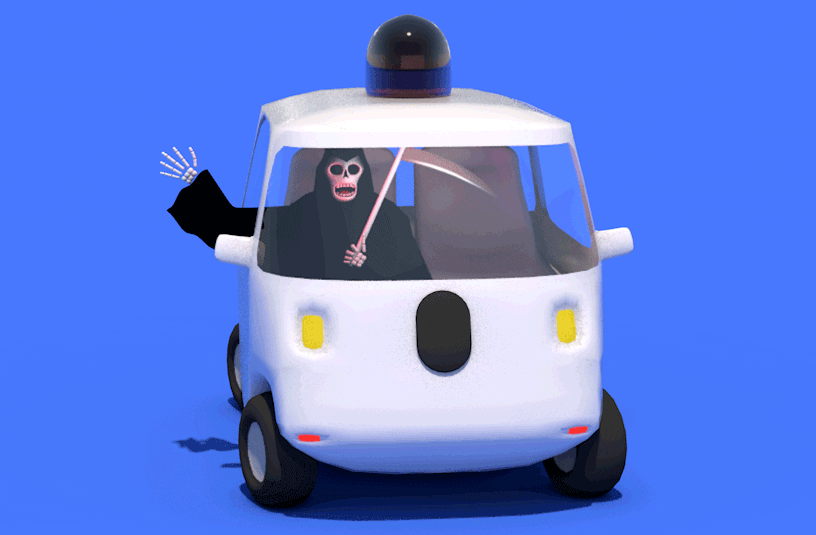October 27, 2020
Autonomous vehicles are a hot topic within emerging technology. Companies like Waymo and Aptiv have repeatedly made headlines with vehicle testing successes [1] [2]. The industry as a whole has attracted over $16B in funding to develop the technology [3].
High hopes for what autonomous vehicles can bring are driving all this attention. They can make our roads safer, free up time spent driving to focus on something else, and they can be used as delivery vehicles to make us safer during this pandemic. Many people are excited about the promises of a better life this technology can bring.
But some are not so ready to accept cars that are driven by machines. In a study last year, AAA found that 71% of people are afraid to ride in fully self-driving vehicles [4]. And even if they don’t ride themselves, many still don’t want these vehicles on the road. More than half of those polled by Pew Research Center said that they would not feel safe sharing the road with autonomous vehicles [5].
Image from Pinterest warning about cell phone radiation. https://in.pinterest.com/pin/381961612126287380/?nic_v2=1a1wLLzsf
Fear of new technology is so prevalent that there is a name for it – technophobia. It’s caused by anxiety from not understanding how the technology works, concerns about unknown risks, and fear of unintended consequences like identity theft. Technophobia is an inevitable and predictable side-effect of new technologies, as Gary Taubes explains in his MIT Technology Review article, “The Cell-Phone Scare” [9]. A result of human nature, technophobia will always be around.
Companies realized how common technophobia is and responded by educating their customers through marketing activities. Elevator ads began featuring children and elderly people operating elevators to showcase their ease of use and safety [6]. Microwave manufacturers comforted the public by explaining the science behind their product [10]. Cell phone manufacturers encouraged acceptance by showing how their devices can bring people together [11]. In each case, eventual public acceptance led to widespread use of the new technologies.
Autonomous vehicles will also see widespread acceptance one day. But before then, technophobia is an unavoidable growing pain. Just like elevator, microwave and cell phone manufacturers, companies developing and commercializing autonomous vehicles will have to be keenly aware of public perception of their technology. More importantly, they will have to educate their customers to overcome the inevitable anxiety. This means sharing details about how autonomous vehicles work, teaching the public about the benefits and limitations, and always acknowledging and appropriately addressing safety concerns.
Public fear of autonomous vehicles is inevitable. But so is their eventual widespread acceptance. The link between the two is education.
Sources
- https://ddswireless.com/blog/heres-why-waymo-is-leading-the-self-driving-car-race/
- https://www.forbes.com/sites/samabuelsamid/2020/02/11/aptiv-self-driving-vehicles-top-100000-rides-in-las-vegas/#4970dccb5439
- https://www.caranddriver.com/news/a30857661/autonomous-car-self-driving-research-expensive/
- https://newsroom.aaa.com/2019/03/americans-fear-self-driving-cars-survey/
- https://www.pewresearch.org/internet/2017/10/04/americans-attitudes-toward-driverless-vehicles/
- https://www.npr.org/2015/07/31/427990392/remembering-when-driverless-elevators-drew-skepticism
- http://www.lateralmag.com/articles/issue-25/zapping-our-fears
- https://www.cancer.gov/about-cancer/causes-prevention/risk/radiation/cell-phones-fact-sheet
- https://www.technologyreview.com/2000/11/01/102129/the-cell-phone-scare/
- http://historyoftech.mcclurken.org/microwave/the-impact/
Authored by the Innovation Team of North American Lighting, A Koito Group Company
Amit Mehta and Dan Davies
Contact: Kayla Boyll, Corporate Branding Specialist: 217-465-6600 Ext. 7429


 Fear of new technology is common in our past. When the “operator-less elevator” made its debut around 1900, people were uncomfortable and refused to ride it [6]. Similarly, microwaves had difficulty gaining acceptance during their early years because of safety fears [7]. More recently, the introduction of cell phones came with concerns of health risks [8]. The first reaction has commonly been fear to what are now everyday technologies.
Fear of new technology is common in our past. When the “operator-less elevator” made its debut around 1900, people were uncomfortable and refused to ride it [6]. Similarly, microwaves had difficulty gaining acceptance during their early years because of safety fears [7]. More recently, the introduction of cell phones came with concerns of health risks [8]. The first reaction has commonly been fear to what are now everyday technologies.